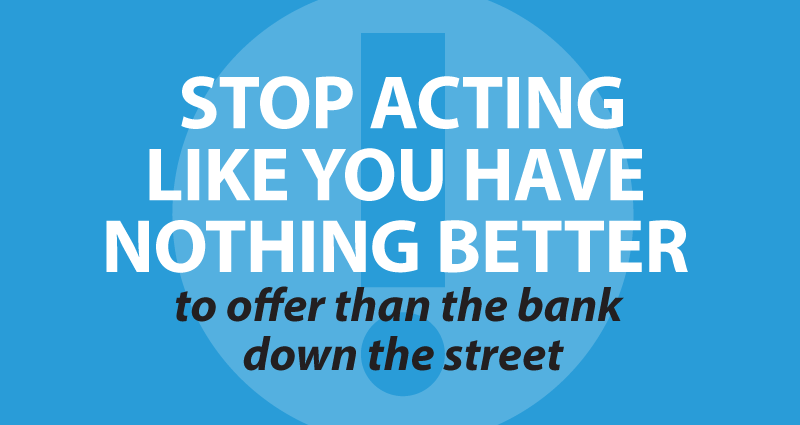
When price is all they care about
As a consumer, if given the choice between buying what looks to be the same product from two different sources, you would choose the one with a lower cost, right? You probably switch brands of tissues or aspirin or dish soap to whatever is on sale at the store this week without even thinking much about it. You have no real investment in one particular brand because they all seem about the same. They are commodities.
Commodities are extremely price sensitive, and competing on price is usually a no-win situation.
Unless you are Walmart, of course, then you have the massive clout to browbeat suppliers and compete on levels of volume and efficiency to beat your competitor’s price. But every other commodity gets compared on just one attribute.
At a credit union, “prices” are usually shown as an interest rate.
Which is why it is painful to see credit unions focus on a giant rate in a promotion, even if their CFO may be campaigning the Marketing department for the idea. CUs have low enough cost of funds that they can get away with the price game for a while, but it’s not good for the long-term health of the institution. It usually only benefits a small number of people, since there is a very small group who do price shop. These are the people who have plenty of assets and excellent credit, so they keep track of rates and already KNOW they’re going to get the best rate. So advertising rate is not completely futile – it just appeals to a very small audience. And, since most of these people are cherry-pickers, you have to understand you’re not getting loyalty along with those deposits or loans.
It also gives competitors the opportunity to easily undercut.
What happens when someone else goes lower? Do you go lower still? How do you compete with a 0% loan from a car company? What happens when even a great rate starts to sound ordinary? Do you know anyone who gets excited about earning 2% interest on a rewards checking product these days?
As for the bigger audience, no one really cares about the specific rate.
What they really want to know is:
1) Will you say yes or will you reject me? Super-low rates can backfire, because many people with minor credit dings figure they’ll never qualify. Rejection hurts, and the only ones who address this fear tend to be the scammy buy-here-pay-here lots. This is huge – the other questions are minor by comparison. The related fear, of course, is that they’ll get an raw deal because of a few minor past mistakes.
2) What’s my payment going to be? Can I handle it? Am I stretching to make this payment every month?
3) Is this loan a good/fair deal? This is much more than rate – for example, being able to make biweekly payments and being able to set up specific payment dates to match pay periods is very important to lots of people. Some people want to know there are no hidden fees, etc.
So get out of the interest rate commodity game.
Give them something else to care about. Tailor your products to add a unique twist or give members options. Differentiate yourself with your branding. Tell a story. Stand for something people can believe in. Stop acting like you have nothing better to offer than the bank down the street. And whatever you do, focus your marketing on something other than rates.
“The reason it seems that price is all your customers care about is that you haven’t given them anything else to care about.” (Seth Godin)
- Why your CU really needs an intranet - February 19, 2025
- Are you scared yet? - October 22, 2024
- OMG! Who really IS our competition?!? - September 24, 2024
